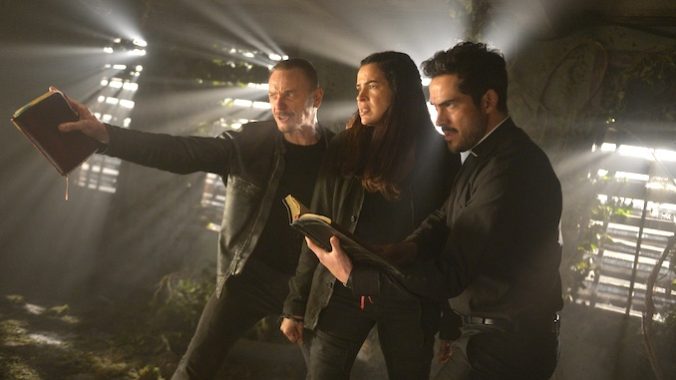TV Rewind: In a Franchise Saddled with Disasters, FOX’s The Exorcist Remains a Compelling Continuation
Photo Courtesy of FOX
Editor’s Note: Welcome to our TV Rewind column! The Paste writers are diving into the streaming catalogue to discuss some of our favorite classic series as well as great shows we’re watching for the first time. Come relive your TV past with us, or discover what should be your next binge watch below:

“Somewhere between science and superstition, there is another world. The world of darkness.” So goes the tagline for William Friedkin’s The Exorcist, the 1973 film that ignited fear across the world, but the same sentiment could also apply to the realm of recently cancelled television. It’s a nebulous space, filled by strange ideas and conditioned by malign influences, where shows with multiple seasons are abandoned and forgotten, only discoverable in the dark corners of isolated streaming services. Here is the final resting place of FOX’s The Exorcist, a two-season continuation of the franchise, and directly inspired by William Peter Blatty’s original novel. It’s said that it can only return to the world of the living if it possesses fledgling TV critics to make them say, “Hey, did you know they made an Exorcist TV show…”
The Exorcist franchise can only be described as a demonic mess. After Friedkin’s smash-hit, Irish filmmaker John Boorman was the first to take over the reins with Exorcist II: The Heretic, a film so bad that it is sometimes regarded as the worst film ever made. (British critic Mark Kermode’s favourite film is The Exorcist and least favourite is Exorcist II.) It would be 13 years before another effort was made with The Exorcist III, this time with original author Blatty as writer-director (it’s great!), but by this point, Exorcist fever fervour had well-and-truly cooled.
Two prequels were released in 2004 (Exorcist: The Beginning) and 2005 (Dominion: Prequel to the Exorcist). Why? The studio baulked at Paul Schrader’s original vision and fired him, reshooting nearly the entire movie with Renny Harlin as director. That film was a disaster upon release, so they released Schrader’s original Prequel to the Exorcist anyway. Hollywood, ladies and gentlemen!
But ten years later, the new hot thing was flashy TV, and horror successes like American Horror Story and The Walking Dead paved the way for another go at making The Exorcist a somewhat-not-embarrassing franchise. In many ways, the new TV landscape was perfect to expand on the property: long-form, episodic formats suit literary adaptations, and the character-driven psychological angles to the original film are more welcome on the small screen. It’s why, even though The Exorcist series may be the “least good” good Exorcist entry, its faithfulness to the core ethos of the original deserves praise in a franchise saddled with disasters.
The Rances are a normal but struggling Catholic Chicagoan family. Henry (Alan Ruck!) is living with a recent traumatic brain injury, often zoning out and forgetting around his family members—which is just another stress for his wife, Angela (Geena Davis!). Both of their daughters have recently undergone an upsetting change: snarky Katherine (Brianne Howey) has become a depressed shut-in after a car accident that killed her girlfriend, and younger sister Casey (Hannah Kasulka) has just become possessed by a demon. When it rains, it pours.
Enter not one, but two exorcists. Local parish priest Father Tomas (Alfonso Herrera, an underdog in the hot priest championships) and rogue exorcist Father Marcus (Ben Daniels, really putting the daddy in the ‘Our Father’) make a shaky union to fight off a demon that turns out to be Pazuzu, the demon that possessed young Regan in the original film. A coincidence? Not really—as we learn halfway into the first season, Angela is grown-up Regan MacNeil, who ran away from her mother Chris (here, played by Sharon Gless). After the events of the first film, Chris capitalised on Regan’s possession in an exploitative memoir, and Regan fled from being tied to Chris’ version of her story.
-

-

-

-

-

-

-

-

-

-

-

-

-

-

-

-

-

-

-

-

-

-

-

-

-

-

-

-

-

-

-

-

-

-

-

-

-

-

-

-








































